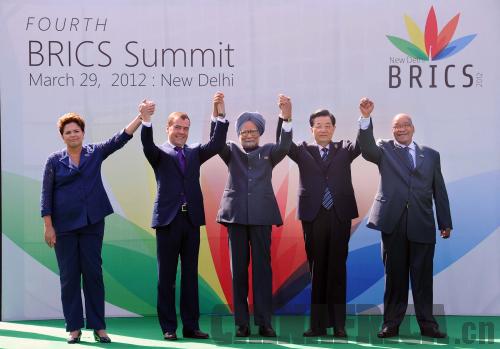|
 |
|
BRICS UNITY: Brazilian President Dilma Rousseff, Russian President Dmitry Medvedev, Indian Prime Minister Manmohan Singh, Chinese President Hu Jintao and South African President Jacob Zuma (left to right) at the BRICS Summit in New Delhi on March 29 (LI TAO) |
In a bold initiative that moves them away from reliance on the U.S. dollar as the international reserve currency, the BRICS members have agreed to extend loans within the group in local currencies. Leaders of the five major emerging economies - Brazil, Russia, India, China and South Africa - reached the agreement at the Fourth BRICS Summit in New Delhi on March 29.
They also forged consensus on global governance and other international issues including Syria, Iran and sustainable development. New agreements reached at the summit will beef up the collective strength of the BRICS nations and enable the group to exert a greater influence in the changing world, analysts said.
Financial cooperation
"Strengthening financial cooperation can help the BRICS economies achieve stable and healthy development, while enhancing their capability to cope with financial crises," said Song Hong, a research fellow with the Chinese Academy of Social Sciences (CASS). "It's their common interests that bind BRICS together."
Since cooperation among the BRICS members is still at a primary stage, it is important for them to reach agreements on specific fields such as infrastructure financing, currency internationalization, financial credit, mutual investment and trade facilitation, said Li Zhongmin, a researcher on BRICS studies with the CASS. These agreements will be significant for the future development of BRICS, he said.
This year's summit turned out to be a milestone of financial cooperation among the BRICS countries. In the Delhi Declaration released after the summit, the leaders reaffirmed their commitment to promoting trade and economic and financial cooperation and announced they are considering jointly establishing a development bank. They also signed important trade and financial pacts on local currency trading.
The master agreement on extending credit facilities in the local currencies of the five countries involves the Brazilian Development Bank, the State Corporation Bank for Development and Foreign Economic Affairs of Russia, the Export-Import Bank of India, the China Development Bank and the Development Bank of Southern Africa. The agreement is supposed to reduce dependence on fully convertible currencies like the U.S. dollar for transactions among the BRICS nations, and help cut transaction costs of intra-BRICS trade. The BRICS multilateral letter of credit confirmation facility agreement envisages the confirmation of lines of credit on receipt of a request from the exporter, the exporter's bank or the importer's bank, so as to serve the goal of promoting intra-BRICS trade.
BRICS development bank
The five BRICS members are all developing countries. They have similar problems that need to be solved such as economic structure, infrastructure, financial markets and imbalanced development, Song said. He added that providing assistance to each other could help them use their spare money and resources in a more efficient way. Plus, Song said, the BRICS mechanism can address the flaws in the current international financial system. By extending loans in local currencies and establishing a currency exchange system, the BRICS members can reduce their over-reliance on the U.S. dollar and lower trade risks while pushing forward the currency internationalization of the BRICS states.
At the summit, the leaders also pondered the possibility of setting up a new development bank to mobilize resources for infrastructure and sustainable development projects in the BRICS countries and other emerging economies and developing countries.
According to Qu Xing, President of the China Institute of International Studies, although the plan showed BRICS' efforts to advance South-South cooperation and improve the World Bank mechanism, it remains a task that is difficult to fulfill within a short time. The West, considering it an attempt to challenge the World Bank, may easily politicize the initiative. It will take a long time and a complicated procedure to define the BRICS development bank's relationship with the World Bank and the International Monetary Fund (IMF), Qu said.
Song pointed out that there are many problems in the current international financial system. For example, developing countries speak with a much weaker voice than developed ones. He suggested that the BRICS countries work together to improve major developing countries' status and increase their influence in international institutions like the IMF, in order to establish a fairer and healthier world economic order.
Emerging economies have become the main engine of global economic growth. BRICS' contribution to world economic growth has exceeded 50 percent. Comparing their contribution, the BRICS countries' voting rights at the IMF are still low, as they occupy only 13 percent of IMF voting rights even after an IMF reform in 2010.
In the Delhi Declaration, the BRICS leaders said they are "concerned at the slow pace of quota and governance reforms in the IMF." They underlined the importance of a comprehensive review of the IMF's quota formula to better reflect the economic weight of emerging markets and developing countries.
|